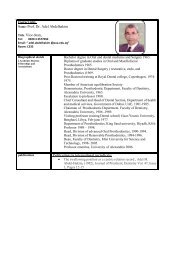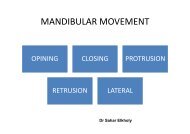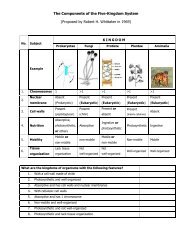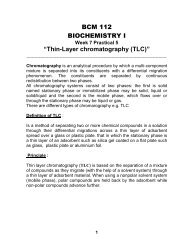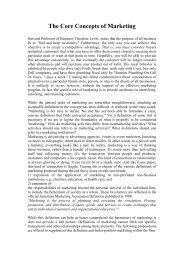E-tourism in England a strategy .pdf
E-tourism in England a strategy .pdf
E-tourism in England a strategy .pdf
You also want an ePaper? Increase the reach of your titles
YUMPU automatically turns print PDFs into web optimized ePapers that Google loves.
<strong>in</strong>formation. Technically, this would be the simplest solution, and could potentially be<br />
developed <strong>in</strong> partnership with a commercial operator, help<strong>in</strong>g to spread the costs and risks.<br />
The ma<strong>in</strong> drawback, however, would be that dest<strong>in</strong>ations with exist<strong>in</strong>g dest<strong>in</strong>ation<br />
management solutions would not <strong>in</strong>tegrate directly <strong>in</strong>to the national DMS and potentially<br />
would lose bus<strong>in</strong>ess to it. This is likely to deter the participation of dest<strong>in</strong>ations with wellestablished<br />
local systems, <strong>in</strong>clud<strong>in</strong>g most seaside resorts and major cities, and result <strong>in</strong><br />
duplication. It would also add <strong>in</strong>convenience for <strong>tourism</strong> providers, who would need to<br />
work with either or both national and local systems. Such non-participation <strong>in</strong> the scheme<br />
seems likely to render this option unattractive to the ma<strong>in</strong> stakeholders, with consequential<br />
reduction of the value to consumers. This would thus fall considerably short of a fully<br />
<strong>in</strong>tegrated English <strong>tourism</strong> <strong>in</strong>dustry.<br />
5.3 A federal network approach<br />
The federal approach comb<strong>in</strong>es the advantages of each of the first two options. It would<br />
deliver the <strong>in</strong>frastructure that would enable <strong>tourism</strong> product <strong>in</strong>formation to be shared via a<br />
national <strong>in</strong>teroperability standard and a communications backbone. This would enable a<br />
national level of content <strong>in</strong>tegration and search capability to enable easy access to <strong>tourism</strong><br />
product <strong>in</strong>formation at national, regional and local levels, <strong>in</strong>clud<strong>in</strong>g access to book<strong>in</strong>g and<br />
payment services. Much of the <strong>in</strong>formation would be ma<strong>in</strong>ta<strong>in</strong>ed locally by RTBs, DMOs and<br />
TICs and exchanged via the communications backbone. DMS suppliers would be<br />
encouraged to participate <strong>in</strong> def<strong>in</strong><strong>in</strong>g the <strong>in</strong>teroperability standard, enabl<strong>in</strong>g them to offer<br />
DMOs <strong>in</strong>tegration with the national framework. DMOs not yet us<strong>in</strong>g such systems would<br />
f<strong>in</strong>d it easier to do so.<br />
This hybrid option seems more likely to attract the greatest uptake of dest<strong>in</strong>ations and<br />
<strong>tourism</strong> providers, br<strong>in</strong>g most <strong>in</strong>tegration and access to the widest sources of product<br />
<strong>in</strong>formation for the consumer, and thereby maximise the success of the project. This should<br />
lead to an overall reduction <strong>in</strong> duplication of data collection and greater participation by<br />
<strong>tourism</strong> providers, lead<strong>in</strong>g to more cost-effective operation. As such, this option would<br />
appear to offer the best prospects for contribut<strong>in</strong>g towards the susta<strong>in</strong>ability of local<br />
<strong>tourism</strong> services, most of which are dependent upon local authority support.<br />
This is therefore the recommended strategic approach – one which was widely supported <strong>in</strong><br />
the consultation process – and forms the basis for the proposed <strong>England</strong>Net Onl<strong>in</strong>e Tourism<br />
Network.<br />
<strong>England</strong>Net is therefore be<strong>in</strong>g developed by ETC and the RTBs, the organisations currently<br />
responsible for manag<strong>in</strong>g national <strong>tourism</strong> data services <strong>in</strong> <strong>England</strong>, as the vehicle to<br />
implement this <strong>strategy</strong>. It will be an <strong>in</strong>dustry-wide network offer<strong>in</strong>g a range of electronic<br />
bus<strong>in</strong>ess and market<strong>in</strong>g services to the <strong>in</strong>dustry, and designed from the outset to work with<br />
exist<strong>in</strong>g dest<strong>in</strong>ation management systems at regional and local level. It is vital that the<br />
implementation of this project should be mutually beneficial to all concerned, lead<strong>in</strong>g to<br />
stronger, more effective work<strong>in</strong>g relationships across the whole sphere of <strong>tourism</strong><br />
development.<br />
The <strong>England</strong>Net objectives and proposed outputs are discussed further <strong>in</strong> section 6.<br />
In adopt<strong>in</strong>g this <strong>strategy</strong>, <strong>England</strong>Net must be realistic about the ability of all DMOs and<br />
DMSs to deliver the necessary <strong>in</strong>put, whether <strong>in</strong> terms of quality or quantity. Inevitably<br />
there will be situations where DMOs do not have the resources or, <strong>in</strong> some cases perhaps,<br />
the motivation, to deliver the <strong>in</strong>put required with<strong>in</strong> the federal approach. Recognis<strong>in</strong>g this,<br />
19/44 A <strong>strategy</strong> for modernis<strong>in</strong>g English <strong>tourism</strong> through e-bus<strong>in</strong>ess – July 2002



